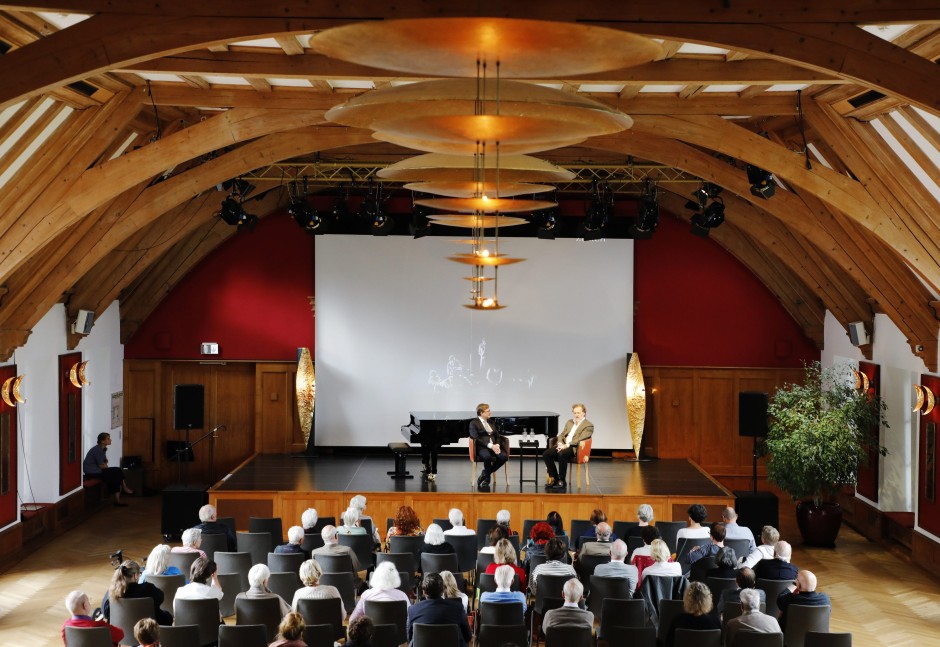Zsoon the stage is completely empty. Only one slogan in Persian and German is projected on the wall in the background. “Zan, Zendegi, Azadai – woman, life, freedom” – six words that will characterize the theater evening in the Berliner Ensemble, which is dedicated to the protests in Iran.
Suddenly the David Klein Quartet begins with a saxophone melody. “If you, like the sun, don’t shine on me, then I’ll get cold,” sings the actress Jasmin Tabatabai. This evening, which reveals the dreams and injuries in Iran, which shows the seemingly hopeless political situation, commemorates the dead and is intended to make the protests clear to the German theater audience, begins with a love song.
It is the jazz song “Gole Sangam”, translated as “flower made of stone”, by Anoushiravan Rohani, which the three German-Iranian actresses Melika Foroutan, Sarah Sandeh and Jasmin Tabatabai chose to show solidarity with the protesters and at the same time to show diversity to celebrate Persian culture. All three organized this evening to “set a sign against the tyranny of the Islamic Republic and for the freedom movement”.
Poem about oppressed women
The solidarity initiative, which also deals critically with Germany’s attitude towards Iran, begins lyrically with the poem “Die Aufziehpuppe” by the poet Forugh Farrochzad, who was born in Tehran in 1935 and is considered the first female poet of Iranian modernism. She wrote autobiographically and took her readers into the private sphere of Iranian families. A subversive process in a country where, according to the novelist Shahrnush Parsipur, “one whispers even behind high walls”. In her short text, which Foroutan reads slowly, she describes the fate of housebound women and criticizes remaining silent in a phase of radical change: “Longer, oh yes, even longer. You can sit still for much longer. You can be like a clockwork doll.” But now is the time to take off that friendly smile, Foroutan says afterwards.
It is precisely the women who are at the forefront of the new protest movement. After the death of Jina Mahsa Amini, who was arrested by the Morality Police on September 16 for not wearing a headscarf in accordance with the moral laws, the protests began and have now lasted eleven weeks. The mullah regime has the internet and the media censored, which is why only fragmentary mobile phone videos in social networks in the West can show the scope.
Natalie Amiri and Isabel Schayani present videos
Natalie Amiri and Isabel Schayani analyze five such videos using questions that enable the audience to classify the riots. All these short films are depressing. They show girls taking off their headscarves and whirling around. In another video, thousands of people run through a provincial town in Kurdistan, the region where Amiri is from, shouting “This is the year of blood”. Then young men are faded in saying “Don’t be afraid. We are here together.” All generations are on the streets, but above all it is a youth revolution.
When Meret Becker recites Fariduddin Attar’s “Secret of the Candle”, it becomes clear what that means for a society in which youthful dreams of freedom are suppressed. The poet, who lived in the 12th century, opposed religious dogmatism and violence. His short story is about a brave moth who bravely climbs into the flame and becomes one with the light. According to the HRANA information service run by human rights activists, 450 demonstrators have been killed so far, including 63 minors. The three actresses read out their names and show the photos of the children and teenagers. Many of them were shot. They account for 16 percent of protester deaths documented by Amnesty International. There is always this courage in Iran – and it often ends in tragedy.
Appearance of Iris Berben
Iris Berben reads excerpts from “Your Name” by Navid Kermani, in which he writes about the public execution of opposition figure Madjid Kawussifar. Collective experiences and joint protests develop from these individual fates, which is reflected in “The King of the Black Robes”, a novel by Huschang Golschiri, who was imprisoned several times by the Shah’s regime. In the book, the supporters of the revolution wear black. They are arrested, interrogated, flogged. In prison, the death row inmates comfort themselves with poems from the Persian tradition.

Participants of the evening on the stage of the Berliner Ensemble
:
Image: Moritz Haase
Current, but just as comforting, is the poem “Bright Horizon” by Ahmad Shamlou. The poet was persecuted by the Shah and Mullah regimes and is also considered an important intellectual trailblazer in the current protests. His poetry is nevertheless characterized by a spirit of optimism and gives hope that the revolution will initiate changes. “One day kindness and beauty will go hand in hand. On that day – the song will be a kiss. And every man will be a brother to every other man,” it says.
But in the end, one appeal by a student from Tehran, which Natalie Amiri reads again, is what sticks in people’s minds. “As soon as Europe doesn’t look, that’s our death sentence. You have to see the protests. That’s the only way to save our lives.” The three actresses end the haunting evening with similar words. “We must amplify the calls of the people of Iran for freedom and equality. So that they continue to be heard here.”















